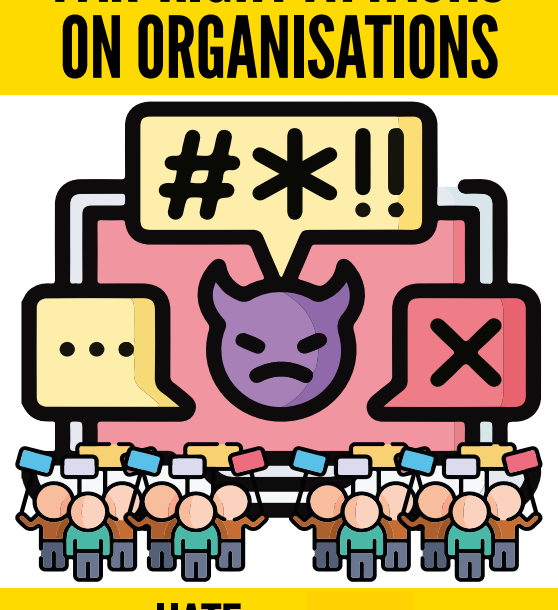‘I don’t feel like your vote counts’: little faith in politics among young people of Nottingham
By Hannah Al-Othman, the Guardian,
Tue 2 Jul 2024 14.00 BST
A handmade banner bearing the words “Generation Fucked” hangs in the window of Earache Records in Nottingham. It is a relic of a past band signed by the label long ago. But the red and black lettering also spells out a rallying cry for the city’s youth.
Nottingham is one of the UK’s youngest cities, with a median age of 31. Here, young people told the Guardian of their heartfelt concerns about the job market, the economy, housing, international conflicts and climate change.
At the last general election, nationwide only 54% of 18- to 25-year-olds voted. Young people say it is not simply an apathy problem but rather a case of not knowing which party will address these issues – or if it’s even worth voting at all.
While young people may be less likely to engage than older generations, they are still a significant electoral force. On 13 June, 330,619 people registered to vote, the highest number of registrations in a single day this year, and 179,285 of them were under 34.

Earache Records sits in Sneinton Market, in the constituency of Nottingham East, alongside many other arty, independent businesses selling chocolates, art prints and craft beer. Many are staffed and owned by people of a similar age to their clientele.
There is widespread dissatisfaction here with the government and a real appetite for change. But young voters are less clear on what that change should look like.
“I definitely don’t want the current government,” says Charlie Dean, 27, who runs the Watered Garden, which sells houseplants beloved by millennials and gen Z. “This is my first year as a business owner. The cost of everything is rising and customers aren’t spending as much money.” Brexit has had an impact, as many of her plants are imported from the Netherlands.
She normally votes Labour but feels “a bit let down by Labour as well at the moment”. She isn’t a fan of Keir Starmer and doesn’t agree with his party’s position on Gaza. She is considering going Green, “but everyone jokes about how that’s a wasted vote”.
Hannah Vernalls, 18, a student, is voting Labour. “It’s just outrageous, the Conservatives, they’ve completely flushed the economy down the drain, there’s no consideration for young people,” she says.
While many of her friends will back leftwing parties, she says some of her peers have taken an interest in Nigel Farage’s Reform, which has mobilised effectively on social media. “You vote Reform if you’re anti-woke,” she says.
The main campus of Nottingham Trent University is in Nottingham East, a constituency that is home to almost twice the average number of students. Of its economically inactive population, 53.1% of people are students, compared with a national average of 26.8%.
Juliette Picton, 22, says she will vote and, like many young people here, is deciding between Labour and Green. “I care about the environment, and social issues,” she says. “It’s pretty much a Labour vote anyway, so [voting] Green wouldn’t affect the outcome.”

Just over the constituency border, on a patch of grass on Nottingham University’s campus, a makeshift camp has been set up made up of students and young people across the city who want to voice their objection to the war in Gaza.
They are angry at the government’s position and disappointed with Labour’s response. Most have little faith in parliamentary politics as a vehicle for change, instead believing that protest – such as their recent action picketing a conference on campus – is more effective.
“I won’t be voting, I’ll be spoiling my ballot this election,” says one 19-year-old protester, who gives her name only as Elizabeth. “I’m upset and disappointed that this is the only option I have. It’s the first election I’m old enough to vote in.”

Rowan Emberley, 21, is also considering spoiling her ballot. “What we’re doing right now feels much more important, voting doesn’t make any difference,” she says.
Many of those on the left feel a disconnect from the political system, and so too do some young voters who lean to the right. It has led to small but growing numbers engaging in far-right politics.
Patrik Hermansson, a senior researcher at Hope Not Hate, says: “Our work, which includes polling, shows that young people feel disconnected from politics. We are also seeing increasing acceptance of reactionary views among young people and an increased interest in engaging in far-right groups and other reactionary movements.”
In Hyson Green, in the west of the constituency, young voters are concerned about the economy, housing and the state of the NHS. Those who are voting all say they will vote Labour but many more say they won’t vote.
This area has some of the highest deprivation in the whole of Nottinghamshire. According to 2021 census data, Hyson Green has more households deprived across the joint four metrics of education, employment, health and housing than most other areas of the county.
Rebecca Davison, 33, out shopping with two of her seven children, is planning to vote Labour because “I just feel they’re more representative of growing families”.

Chelsea Grant, 29, shopping with her daughter Jahnaea, three, says she has “lots” of concerns about the state of the country but doesn’t intend to vote. “I can’t see anything being resolved at the moment,” she says. “I don’t feel like your vote actually counts.”
Even with a low turnout, Nottingham East is unlikely to vote anything but Labour. Electoral Calculus rates Labour’s chances of winning here at 100% and predicts Reform will come second, while MRP polling from YouGov also predicts an easy Labour win but with the Greens in second.
In May’s mayoral election, the Green candidate for East Midlands mayor received 50,000 votes in a race won by Labour’s Claire Ward with 180,000. Rosemary Palmer, the Greens’ candidate for Nottingham East, says: “At that election we were snapping at Labour’s heels in Nottingham and we expect to do the same again.” She expects to be the runner-up on Thursday.
In 2019 the Conservatives came second here. “My campaign is all about the local issues,” says the Tory candidate, Johno Lee. This is not because of Rishi Sunak’s poll ratings, he says, but because Labour “have run the city council for at least 20 years and they’ve completely destroyed the city”.
Local services have been axed and residents have had to sweep their own streets, he says – although his Labour rival says this is down to cuts by central government.


Labour’s Nadia Whittome was just 23 when she was elected in 2019, the youngest person to take a seat in the House of Commons that year. The former care worker is more in tune than most politicians with the youth vote. With Labour’s manifesto “we’ve a good start”, she says – “but there’s further yet to go”.
Her party has promised to “increase the engagement of young people in our vibrant democracy” by giving 16- and 17-year-olds the right to vote in all elections.
Buba Sanneh, 16, part of Fearless Youth Association, a Nottingham-based youth organisation, says: “I think the majority of 16-year-olds are mature enough now to be able to vote. I feel like it is good for 16-year-olds to have a say as well as adults.”
Sitting around a table discussing politics on a Friday evening, members of the group are more engaged and informed than some adults, despite being too young to vote. “It looks like Rishi Sunak’s time’s up,” says Lamin Touray, 16. “I don’t think he’s really serious about the country’s needs … he doesn’t really understand the struggles of people.”

Whittome says she was pleased to see votes for 16- and 17-year-olds in the manifesto. “Because that’s the first step to breaking that vicious cycle whereby young people don’t see policies that appeal to them, that address the issues that they’re facing, so don’t vote, and then political parties think that they don’t need to cater to young people, so don’t.”
She knows that many young people are not completely aligned with Labour policies, but she says she tells wavering voters: “I’m not asking you to put your faith in just a political party, I’m asking you to do this with me, to do this together, to have trust not in politicians delivering things for you, but in our ability to create a movement that makes sure that they happen.”

